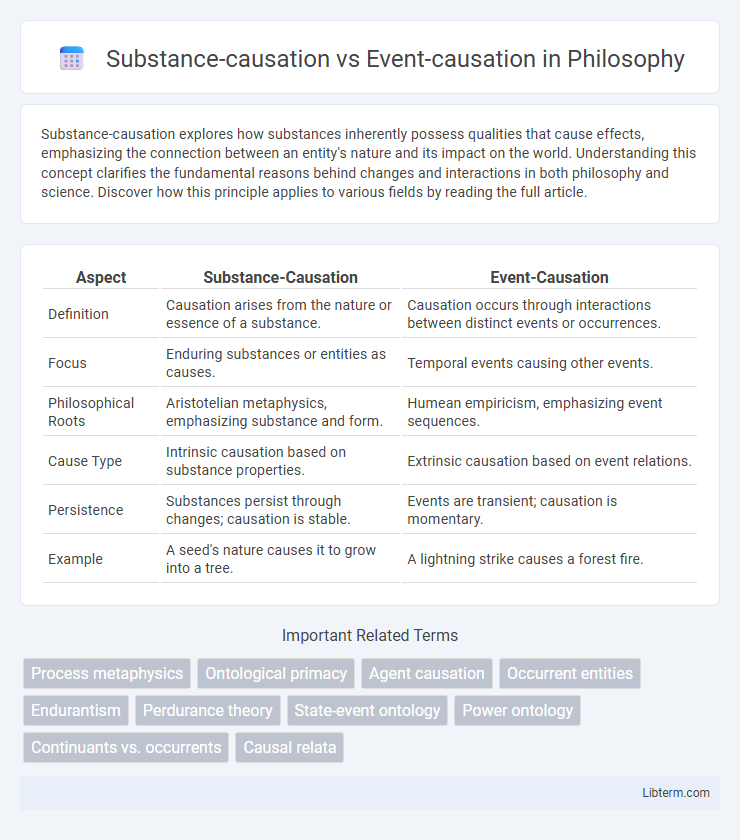Substance-causation explores how substances inherently possess qualities that cause effects, emphasizing the connection between an entity's nature and its impact on the world. Understanding this concept clarifies the fundamental reasons behind changes and interactions in both philosophy and science. Discover how this principle applies to various fields by reading the full article.
Table of Comparison
| Aspect | Substance-Causation | Event-Causation |
|---|---|---|
| Definition | Causation arises from the nature or essence of a substance. | Causation occurs through interactions between distinct events or occurrences. |
| Focus | Enduring substances or entities as causes. | Temporal events causing other events. |
| Philosophical Roots | Aristotelian metaphysics, emphasizing substance and form. | Humean empiricism, emphasizing event sequences. |
| Cause Type | Intrinsic causation based on substance properties. | Extrinsic causation based on event relations. |
| Persistence | Substances persist through changes; causation is stable. | Events are transient; causation is momentary. |
| Example | A seed's nature causes it to grow into a tree. | A lightning strike causes a forest fire. |
Introduction to Substance-Causation and Event-Causation
Substance-causation emphasizes that substances, as enduring entities, are the primary bearers of causal power, grounding causality in the inherent properties of objects. Event-causation, by contrast, locates causality within occurrences or changes, viewing events as the fundamental units where cause and effect relations manifest. Understanding the distinction between substance-based and event-based causal frameworks is crucial for metaphysical analysis and theories of causality.
Defining Substance-Causation
Substance-causation refers to the idea that substances or objects themselves possess causal powers that bring about effects, independent of specific events or changes. It emphasizes the intrinsic properties and powers of entities as the fundamental sources of causation rather than merely the temporal succession of events. This contrasts with event-causation, which focuses on causal relationships between discrete occurrences or changes in states.
Understanding Event-Causation
Event-causation emphasizes the relationship between distinct events, where one event directly brings about another in a temporal sequence, highlighting dynamic processes and interactions rather than static entities. This perspective allows for a detailed analysis of causal chains by examining how specific occurrences influence subsequent outcomes, making it essential for fields such as philosophy of science and metaphysics. Understanding event-causation requires recognizing the importance of temporal order, causal mechanisms, and the contextual conditions that enable one event to produce another effectively.
Historical Development of Causation Theories
The historical development of causation theories reveals a shift from substance-causation, which attributes causality to inherent substances or entities, to event-causation, emphasizing interactions and changes between events over time. Classical philosophy, especially Aristotle's four causes, laid the groundwork for substance-causation, while early modern philosophers like David Hume advanced event-causation by analyzing temporal sequences and regularities among events. This evolution reflects a broader transition in metaphysics and science toward understanding causation as dynamic processes rather than fixed entities.
Key Differences Between Substance and Event-Causation
Substance-causation centers on the idea that causality involves the transfer or influence of an entity's inherent properties, emphasizing the persistence of substances as causal agents. Event-causation, by contrast, focuses on specific occurrences or changes in states as the primary cause of effects, highlighting temporal sequences of events rather than enduring entities. Key differences include substance-causation's reliance on underlying materials maintaining causality over time, whereas event-causation prioritizes discrete, time-bound interactions for explaining cause and effect relationships.
Philosophical Arguments for Substance-Causation
Philosophical arguments for substance-causation emphasize that substances possess intrinsic properties enabling them to be true causes, not mere event sequences. This view holds that causation is grounded in enduring entities with causal powers, contrasting with event-causation theories that reduce causes to specific incidents. Key proponents argue that without substances, explaining causal interactions and the persistence of effects becomes metaphysically problematic.
Philosophical Arguments for Event-Causation
Event-causation emphasizes the relationship between specific occurrences, arguing that causality is best understood through interactions among events rather than substances. Philosophers defending event-causation highlight its explanatory power in accounting for change and temporal sequences, contending that substances alone cannot adequately explain the dynamics of cause and effect. This perspective is supported by analytical frameworks that focus on the temporal, relational, and contingent nature of events to clarify causal connections in metaphysics.
Implications in Metaphysics and Science
Substance-causation emphasizes that a persisting entity (substance) is the cause of changes, influencing metaphysical discussions on identity and persistence over time. Event-causation locates causality in discrete occurrences, aligning with scientific methodologies that analyze temporal sequences and mechanisms of change. This distinction impacts interpretations of causal chains, the nature of persistence, and experimental approaches in both philosophy and empirical science.
Criticisms and Controversies
Substance-causation faces criticisms for its reliance on metaphysical entities as the primary agents of change, often regarded as vague or overly abstract without empirical support. Event-causation is contested for potentially reducing causality to mere sequences of events, ignoring the underlying substances that might sustain these events. Both perspectives generate debate in philosophy, with disagreements centered on whether causation is best understood through entities or processes, impacting interpretations in metaphysics and the philosophy of science.
Conclusion and Future Perspectives
Substance-causation emphasizes the inherent properties of entities as the source of causation, while event-causation centers on interactions and occurrences as causal agents. Future perspectives suggest integrating these views using advanced metaphysical frameworks and empirical findings from quantum mechanics and neuroscience to better explain complex causality. Enhanced interdisciplinary research may refine causal models, promoting a comprehensive understanding applicable in philosophy, science, and artificial intelligence.
Substance-causation Infographic

 libterm.com
libterm.com